Remember the halcyon days of 2009 as the echoes of “change we can believe in” and “yes we can” hadn’t yet succumbed to dashed hopes and dying dreams. America had cut the cord of centuries of racial bias and elected a black man president. Dreams of My Father, Obama’s opus, reinvigorated our belief in the myth of a chosen people.
He promised to tackle health care first—its ruinous costs, the inadequacies of the private insurance market, the sky-high doctors’ fees, the exploding hospital and drug costs. It would be a “morning in America” moment. “I’m going to have all the negotiations around a big table…We’ll have the negotiations televised on CSAN…that approach …is what is going to allow people to stay involved in the process.” What actually showed up was a warmed-over plan, written by the conservative, business-oriented Heritage Foundation, and fleshed out in secret by health care lobbyists. Notably absent from the deliberations were universal healthcare advocates.
What came out of this double-dealing depends on who you believe. Obama spun it as “reforms that will finally cut the cost of health care. Families will save on their premiums…every health economist will tell you… in terms of starting to reduce costs for families, businesses and government, those elements are in this bill. Reality had a different take. Fact: in 2015, the U.S. spent three times more on healthcare than any advanced industrial country and Americans wound up living shorter lives than the people in most other high income countries. 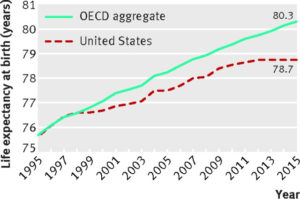 FACT: rather than “cutting the cost of healthcare,” according to federal bean counters, in 2017 health care spending is estimated to have risen 4.6% to $3.5 trillion which works out to $10,348 per person.
FACT: rather than “cutting the cost of healthcare,” according to federal bean counters, in 2017 health care spending is estimated to have risen 4.6% to $3.5 trillion which works out to $10,348 per person.
The results of the 2016 election were barely tabulated when the new president moved to replace Obamacare putting in its place —well, nothing as it turned out. If Trump’s plan had passed, according to the Congressional Budget Office, 15 million Americans would have lost the crappy, expensive coverage Obamacare provided. A total of 23 million more might have lost the same coverage by 2026. Also included in the plan —sharp cuts to Medicaid, a gut punch to poor Americans and premium increases for older and sicker Americans. Turns out it’s a zero-sum game. Whether the Republicans or Democrats are in charge, the promised land is reserved for the heavy hitters in the drug cartels (Big Pharma), the gangsters running the health insurance swindles, and the medical “professionals” busily insulating themselves in LLCs and other forms of corporate fiefdoms to maximize income while minimizing care.
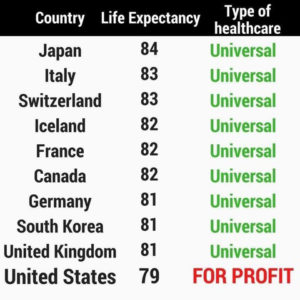
Compared to other industrialized countries, which started offering universal health care to their citizens by the late nineteenth and early twentieth centuries, the U.S. has seen a procession of presidents too busy waging war to fight for health care reform in the face of deep-pocketed opposition.
Health reform efforts have not been limited to presidents and congress. Prior to World War I, the progressive movement mounted a briefly successful challenge to two-party politics and produced several modest health proposals aimed at workers and the poor. Progressivism and health care reform were both victims of World War I and the rise of anti-Communist hysteria.
In 1935, FDR flirted with including a universal health insurance plan in his social security legislation but held back fearing a backlash that would have threatened passage of social security. In 1939 a national health care law came out of the senate. FDR, in the midst of every president’s favorite occupation — war planning — refused to support it.
FDR’s death brought a new sheriff to town. President Truman, having exhausted for a time his war-lust on the incineration of the people of Hiroshima and Nagasaki, transformed himself into a universal health-care champion: “Millions of our citizens do not now have a full measure of opportunity to achieve and enjoy good health. Millions do not now have protection or security against the effects of sickness. The time has arrived to help them attain that opportunity and that protection.” Unlike most past and future presidents (think FDR and Obama) Truman usually said what he meant and meant what he said and delivered a healthcare plan that made no distinction between rich and poor. All were to be treated equally, It also addressed the elephant in the room —the cost of individual medical care. His message to the people is as relevant today as it was seventy-three years ago: “The principal reason why people do not receive the care they need is that they cannot afford to pay for it…at the time they need it. That is true not only for needy persons [but] for a large proportion of normally self-supporting persons.”
The bill died in congress. As with most other plans that benefit the majority and do not hold out pots of gold for the wealthy, the usual suspects —the AMA, ABA, insurance companies, business leaders, conservative politicians, even the unions (afraid that they would lose a bargaining chip in their collective bargaining negotiations)—circled the wagons and called in the lobbyists. In an era of communist witch-hunts á la McCarthy, Truman was accused by the AMA of being “a follower of the Moscow party line, his plan “socialized medicine.” As the proposal was in a death spiral, President Truman, succumbing to the perennial war lust of U.S. presidents, invaded Korea. R.I.P Universal Healthcare.
Truman’s efforts did not go unnoticed. In 1965, President Johnson signed Medicare into law at the Truman library. Hailing Truman as “the real daddy of Medicare.” Truman, then 81, was enrolled as Medicare’s first beneficiary and received the first Medicare card.
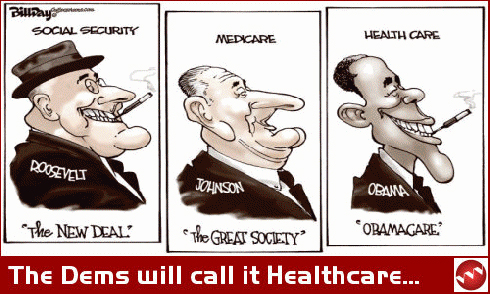
In 1971 President Nixon’s health care proposal which preserved private industry’s role in health care was welcomed (tepidly) as an alternative to the dreaded single payer. Irony abounds — a health care plan of a conservative Republican president that, in the opinion of most economists, would have covered more people than the plan of a progressive democrat {Obama). Here’s “tricky Dick” pitching the plan: “Those who need care most often get care least. And even when the poor do get service, it’s often second rate. The situation will be corrected only when the poor have sufficient purchasing power to enter the medical marketplace on equal terms with those who are more affluent.” Nixon’s plan included an employer mandate for all full-time employees, expansion of Medicare with additional benefits for seniors and low-cost coverage to those who needed it – everyone in, no one out.
In a twist worthy of Dashiell Hammett, Nixon’s initial plan was opposed by none other than Ted Kennedy, universal healthcare’s guru. In 1974, the two agreed on a compromise bill (that probably would have made it into law). Then Watergate happened, Nixon was swept out of office, and the plan died. The question has often been asked (perhaps by Kennedy himself) — what if he had not opposed Nixon’s original plan. One health policy expert opined “In retrospect, 1974 was the closest we have ever come to enacting national health insurance, and Democrats made a great mistake by not eagerly embracing [President Richard] Nixon’s proposal, the distance between Kennedy and Nixon then was so small by comparison with the distance that exists now between Democrats and Republicans.”

Why hasn’t the most advanced economy in the world been able to institute universal health care? The simple answer: defrauding the people is too profitable. The biggest U.S. insurance company, United Healthcare, has seen its share price increase an eye-popping 480% since Obamacare. Its CEO made $66 million in 2017. A new money-making opportunity surfaced recently when Aetna and Humana teamed up with CVS and Walmart to deliver health care in their retail outlets. Obamacare has become the gift that keeps on giving.
But wait there’s more. Federal Defense Contractors Find a New Profitable Business: Obamacare” (PBS.org). “The biggest opportunities …are efforts associated with the ACA [aka Obamacare],” according to a Lockheed Martin executive. Defense contractors, the likes of Boeing, Lockheed Martin, and General Dynamics, are hightailing over to the Department of Health and Human Services (purchasing agents for Obamacare) to take their place at the feeding trough. Lockheed Martin, an early entrant into the Obamacare money grab, has been rewarded with a 5-fold stock increase. Raytheon and Northrop Grumman, two other defense powerhouses on the HHS suppliers’ list, are seeing similar increases.
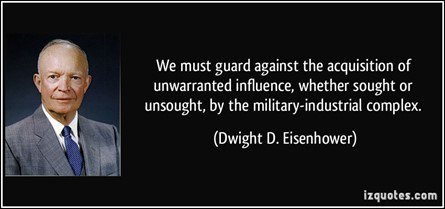
Let’s face it, as long as the health care money spigot is flowing into the pockets of already hugely profitable corporations, as long as defense industry heavies are seeing their stocks soar as a result of investments in healthcare related businesses, as long as people are satisfied with a crappy health system that makes medical debt the leading cause of bankruptcy in the U.S., as long as politicians snooze while health care money winds up on the bottom line of U.S. corporations, as long as people die while corporate bottom lines swell, it will be business as usual.
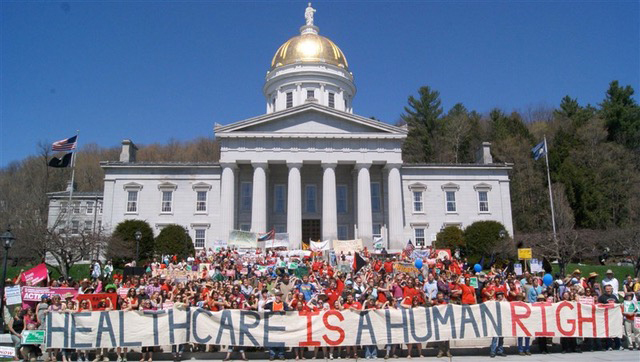
The usual remedies are available. Supporting politicians who are (or say they are) willing to vote for single payer universal health care, throwing out the bums who toe the line of their biggest donors in the medical-industrial complex, and protesting in the streets outside the offices of the power brokers and elected representatives. Where has it gotten us? Unarmed black men are still being murdered by what passes for law enforcement in the U.S., black men are still being arrested for the crime of being black. The automatic response: let’s take it to the street. What follows is predictable. When it’s death by cop— widespread coverage of grieving relatives, outrage “sweeping the country” armed police facing down crowds of protestors. Then nothing. What passes for the justice system in the U.S. sends out one of its flacks several weeks later to apologize and exonerate the murderers. When it’s black men arrested, corporate damage control goes into high gear. Abject apologies, condemnation rained down on the head of the designated fall guy (usually a minimum wage employee) who is then sent into corporate purgatory. Massive demonstrations covered by the mainstream media. A few weeks passes, then nothing.
Protesting social injustices tend to separate rather than unite us —#MeToo, Black Lives Matter, abortion rights, the list is long, the causes worthy, but economic injustice is at the root of the social problems that dog the lives of women, blacks, LBGTQ people, and the poor. “There are a thousand hacking at the branches of evil to one who is striking at the root.” (Thoreau) U.S. health care is the poster child for economic injustice where the penalty for illness is bankruptcy or death.
Let’s stop cutting away the branches and concentrate on the root. Transforming our political system with a few good women and men cuts deeply into the root. Working together in our communities to identify, nurture and support potential leaders who will live up to their campaign promises is the best way to bring economic injustice to heel and make an America for the people not the oligarchs.
Universal health care is a good place to start.
1,097 total views, 1 views today

